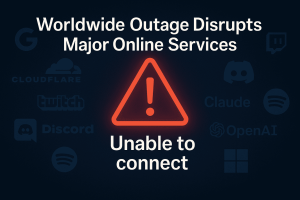Certainly! Here’s an extensive article on how cyberattacks are impacting German companies.## Cyberattacks Drag German Companies into Ruin: A Growing ThreatThe German business landscape is facing a relentless onslaught of cyberattacks, pushing numerous companies to the brink of bankruptcy. While Germany boasts a strong economy and technological prowess, its vulnerability to sophisticated cybercrime is increasingly apparent. The consequences extend far beyond simple data breaches; they represent a significant threat to economic stability and national security.The Rising Tide of Ransomware and Beyond:The most prevalent threat is ransomware, a type of malware that encrypts a company’s data, rendering it inaccessible unless a ransom is paid. However, the problem is far more nuanced than simply paying a fee. Even if a company pays the ransom, there’s no guarantee of data recovery, and the reputational damage can be catastrophic. Furthermore, many companies lack adequate cybersecurity insurance, leaving them financially exposed.Case Studies of Devastation:Several high-profile cases illustrate the devastating impact of cyberattacks on German businesses:[Insert Name of Company 1]: A recent attack on [Company 1’s Industry] company [Insert Name of Company 1] resulted in [Specific details of the attack, e.g., data breach, system shutdown, financial losses]. The company was forced to [Actions taken, e.g., file for bankruptcy, lay off employees, cease operations].[Insert Name of Company 2]: [Insert Name of Company 2], a [Company 2’s Industry] firm, suffered a similar fate after a ransomware attack crippled its operations. The attack led to [Specific details of the attack and its consequences].[Insert Name of Company 3]: [Insert Name of Company 3], a smaller business in [Industry], was unable to recover from a cyberattack due to [Reasons for inability to recover]. This highlights how even small and medium-sized enterprises (SMEs) are particularly vulnerable.The Economic Fallout:The financial consequences are staggering. Cyberattacks lead to direct losses from ransom payments, data recovery costs, legal fees, and business interruption. Indirect costs include lost productivity, damaged reputation, and customer churn. The cumulative effect can be crippling, especially for smaller businesses with limited resources.Beyond Financial Ruin:The impact extends beyond financial ruin. Cyberattacks can compromise sensitive customer data, leading to legal repercussions and reputational damage. They can also disrupt supply chains, impacting other businesses within the ecosystem. The loss of intellectual property can have long-term consequences for innovation and competitiveness.Addressing the Challenge:Germany needs a multi-pronged approach to combat this growing threat:Enhanced Cybersecurity Infrastructure: Investing in robust cybersecurity infrastructure is paramount, including advanced threat detection systems, employee training programs, and regular security audits.Increased Collaboration: Strengthening collaboration between government agencies, law enforcement, and the private sector is crucial for sharing information and coordinating responses.Cybersecurity Awareness: Raising public awareness about cybersecurity threats and best practices is essential to prevent future attacks.Legal Framework: A strong legal framework is needed to hold perpetrators accountable and provide support for victims.Conclusion:Cyberattacks pose a grave threat to the German economy, pushing companies towards bankruptcy and undermining national competitiveness. A proactive and comprehensive approach is needed to mitigate the risks and build a more resilient cybersecurity ecosystem. The future of German businesses hinges on the nation’s ability to address this challenge effectively.Cyberattacks: Dragging German Companies into RuinThe digital landscape, while offering unprecedented opportunities, presents a growing threat to businesses worldwide. Germany, a global economic powerhouse, is not immune to the devastating consequences of cyberattacks. From crippling ransomware attacks to sophisticated data breaches, German companies across various sectors are facing financial ruin and reputational damage. This article delves into the escalating crisis, examining the types of attacks, their impact, and the urgent need for proactive measures.The Rising Tide of Cybercrime:Germany’s robust industrial base and advanced digital infrastructure make it an attractive target for cybercriminals. The frequency and sophistication of attacks are increasing exponentially, leaving even well-established companies vulnerable. Ransomware attacks, where malicious software encrypts data and demands a ransom for its release, are particularly prevalent. These attacks can bring operations to a standstill, leading to significant financial losses, production delays, and potential bankruptcy.Types of Attacks and Their Impact:The range of cyberattacks targeting German companies is vast and includes:Ransomware: This remains the most prominent threat, crippling businesses by encrypting critical data and demanding hefty ransoms. The disruption to operations, coupled with the cost of recovery, can be insurmountable for many companies.Data Breaches: The theft of sensitive customer data, intellectual property, and financial information can result in significant legal liabilities, reputational damage, and loss of customer trust.Phishing and Social Engineering: These attacks exploit human psychology to trick employees into revealing sensitive information or downloading malicious software.Supply Chain Attacks: Compromising a company’s suppliers can provide a backdoor into their systems, allowing attackers to infiltrate and disrupt operations.Denial-of-Service (DoS) Attacks: These attacks flood a company’s servers with traffic, rendering their online services inaccessible to customers.The Economic Toll:The economic consequences of cyberattacks on German companies are staggering. The direct costs include ransom payments, data recovery expenses, legal fees, and the cost of implementing new security measures. Indirect costs, such as lost revenue, reputational damage, and the loss of customer trust, can be even more significant. The cumulative effect can push companies into insolvency, leading to job losses and economic instability.Government Response and Industry Initiatives:The German government is increasingly aware of the threat and is taking steps to improve cybersecurity infrastructure and enhance national resilience. Initiatives include funding research and development in cybersecurity, strengthening cybersecurity regulations, and promoting public awareness campaigns. The private sector is also responding, with companies investing in advanced security technologies and developing robust incident response plans.Proactive Measures for Businesses:German companies must adopt a proactive approach to cybersecurity to mitigate the risks. This includes:Investing in robust cybersecurity infrastructure: This involves implementing advanced security technologies, such as firewalls, intrusion detection systems, and endpoint protection solutions.Developing comprehensive incident response plans: Having a clear plan in place to handle a cyberattack is crucial to minimizing the damage.Training employees on cybersecurity best practices: Raising employee awareness of phishing scams and other social engineering tactics is essential.Regularly backing up data: This allows companies to recover data quickly in the event of a ransomware attack.Working with cybersecurity experts: Seeking professional advice and assistance is crucial to developing and maintaining a strong cybersecurity posture.Conclusion:Cyberattacks represent a clear and present danger to German companies. The economic consequences can be devastating, pushing businesses into insolvency and undermining economic stability. By investing in robust cybersecurity measures, implementing comprehensive incident response plans, and fostering a culture of cybersecurity awareness, German companies can significantly reduce their vulnerability and protect themselves from the growing threat of cybercrime.Cyberattacks: The Silent Threat Dragging German Companies into RuinGermany’s robust economy is facing a growing threat from the digital realm: cyberattacks. These aren’t just minor inconveniences; they’re increasingly driving companies, both large and small, into bankruptcy. The sheer scale and sophistication of these attacks are leaving businesses struggling to survive, exposing vulnerabilities in infrastructure and highlighting a critical need for enhanced cybersecurity measures.The Rising Tide of Ransomware:Ransomware attacks are at the forefront of this crisis. These malicious software programs encrypt a company’s data, rendering it inaccessible until a ransom is paid. The financial burden of paying the ransom, coupled with the downtime and potential loss of sensitive information, can be crippling. Even if a company chooses not to pay, the recovery process can be extremely costly and time-consuming, potentially leading to irreparable damage.Case Studies: From Local Businesses to National Players:The impact of these attacks isn’t limited to small businesses. We’ve seen high-profile cases of well-established German companies falling victim to sophisticated cyberattacks, leading to significant financial losses, reputational damage, and even bankruptcy. These cases highlight the pervasiveness of the threat and the urgent need for proactive security measures.Example 1: A medium-sized manufacturing company was hit with a ransomware attack that encrypted its entire production system. The downtime resulted in significant losses in production, and the company was forced to pay a substantial ransom to regain access to its data. The financial strain ultimately led to the company’s insolvency.Example 2: A regional logistics company experienced a data breach, exposing sensitive customer information. The resulting legal fees, reputational damage, and loss of customer trust proved insurmountable, leading to the company’s closure.Beyond Ransomware: The Broader Impact:The consequences extend beyond ransomware. Data breaches can expose confidential information, leading to legal battles, fines, and damage to a company’s reputation. Supply chain disruptions caused by cyberattacks can also have devastating consequences, impacting production and leading to financial instability. The cumulative effect of these factors can quickly overwhelm even the most resilient businesses.The Need for Proactive Measures:The situation demands a multi-pronged approach to cybersecurity. German companies must invest in robust security measures, including:Employee Training: Educating employees about phishing scams, malware, and other cyber threats is crucial. Human error remains a major vulnerability.Advanced Security Technologies: Implementing advanced security technologies, such as firewalls, intrusion detection systems, and endpoint protection, is essential.Regular Security Audits: Regular security audits can help identify vulnerabilities and ensure that security measures are up-to-date and effective.Incident Response Planning: Having a comprehensive incident response plan in place can help minimize the damage caused by a cyberattack.Government Support and Collaboration: Stronger government support and collaboration between public and private sectors are needed to share threat intelligence and develop effective cybersecurity strategies.The Future of Cybersecurity in Germany:The fight against cybercrime is an ongoing battle. The sophistication of cyberattacks is constantly evolving, demanding continuous adaptation and investment in cybersecurity infrastructure. A collaborative effort between businesses, government agencies, and cybersecurity experts is crucial to protect Germany’s economic future from this growing threat. Failure to act decisively will only lead to more German companies falling victim to this silent, but devastating, form of economic warfare. ⚠️✖️➕️
Absolutely! Here are some notable examples of German companies that have faced significant cyberattacks:Oiltanking GmbH and Mabanaft Group:In January 2022, these subsidiaries of the Marquard & Bahls group suffered a cyberattack attributed to the Russia-linked Black Cat gang (also known as ALPHV). The attack compromised their IT systems, leading to operational disruptions.Fasana:This traditional serviette manufacturer had to halt production due to a cyberattack, ultimately leading to its insolvency. The attack severely impacted their operations and financial stability.Einhaus-Gruppe:After a ransomware attack two years prior, this company, which specialized in smartphone insurance, filed for bankruptcy. They paid a ransom of €200,000 but faced significant operational disruptions and





















